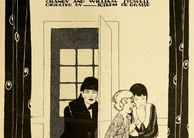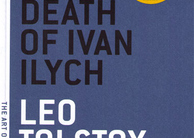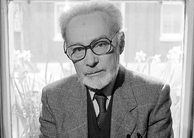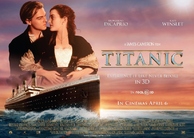|
2010 Volume 2 Issue 3
2010, Vol. 2 No. 03
In Henrik Ibsen's A Doll's House, Nora Helmer spends most of her on-stage time as a doll: a vapid, passive character with little personality of her own. Her whole life is a construct of societal norms and the expectations of others. Until she comes... Read Article »
2010, Vol. 2 No. 03
In Leo Tolstoy's The Death of Ivan Illyich, the story's protagonist--Ivan--is dead before the story begins. The first chapter concerns itself with some of Ivan’s work associates. With the exception of a posthumous cameo, Tolstoy completely... Read Article »
2010, Vol. 2 No. 03
“Human rights” is a concept so deeply intertwined into the modern discourse that it seems almost impossible to question it or refer to any standard beyond it. The problematic nature of this issue is not so much that people have different... Read Article »
2010, Vol. 2 No. 03
Every person has a birthplace, a starting point that offers a sense of identity for an individual. Through this start, this receding to the roots mentality, one examines their present in terms of their constructed past. Salman Rushdie touches upon... Read Article »
2010, Vol. 2 No. 03
Despite critics’ assumption that WALL-E centers its plot upon an anti-pollution/sustainability theme, the writer Andrew Stanton never intended his movie to contain an environmental message. Instead, what he intended to do was create a movie... Read Article »
2010, Vol. 2 No. 03
The United Nations states that at its broadest, Corporate Social Responsibility (CSR) can be defined as the overall contribution of business to sustainable development (UNDESA, 2007). That being said, unmonitored corporate social responsibility... Read Article »
2010, Vol. 2 No. 03
Established around 500 BCE by Siddhartha Gotama, known better as Buddha, Buddhism has since spread throughout the world, attracting individuals from all walks of life. Since its beginnings when Buddha reached enlightenment beneath a gopi tree after... Read Article »
2010, Vol. 2 No. 03
With over 20% of United States power production being of a nuclear nature, and all of this nuclear production generating high-level nuclear waste, the US has already accumulated large quantities of volatile nuclear waste and will only have more... Read Article »
2010, Vol. 2 No. 03
On its simplest level, Jasmila Zbanic’s 2006 film Grbavica examines how the Yugoslav wars of the 1990s still shape life in post-conflict Sarajevo. The film’s protagonist, Esma, is struggling to cope with the aftermath of being a victim... Read Article »
2010, Vol. 2 No. 03
The Musée du Quai Branly opened under the long shadow of the Eiffel Tower in 2006 to spectacular criticism. Initiated primarily at the behest of then-President Jacques Chirac (b. 1932, held office from 1995-2007), the museum possesses an... Read Article »
2010, Vol. 2 No. 03
In America, the years from 1946 to 1962, labeled the “post classical era” of cinema, were years in a state of transition. American culture was simply unstoppable and alive, constantly changing and growing toward a more open society.... Read Article »
2010, Vol. 2 No. 03
On November 2nd, 2000, FOX News declared George W. Bush to be the next President of the United States (Moore 36). Within four minutes, CBS, ABC, CNN, and NBC had all decided this was also true (36). The source of this knowledge was none other than... Read Article »
2010, Vol. 2 No. 03
At the University of Southern California Film School, there are two main goals: to foster creativity and encourage technical growth. As the Cinema-Television School website states, “This is an environment in which the flow of creativity... Read Article »
2010, Vol. 2 No. 03
German cinema from 1927 to 1945 was affected drastically by the political environment that grew within the nation. After Germany suffered drastically at the hands of the Versailles treaty and its reparations clause, Adolph Hitler, the Fuhrer of... Read Article »
2010, Vol. 2 No. 03
The question of the legalization of drugs has emerged sporadically throughout the past few decades of national and international politics, resulting in a plethora of opposing viewpoints. The heated debate has consumed the American public, and as... Read Article »
2010, Vol. 2 No. 03
The holocaust proved that morality is adaptable in extreme circumstances. Traditional morality ceased to be so within the barbed wire of the concentration camps. Within the camps, prisoners were not treated like humans and therefore adapted... Read Article »
2010, Vol. 2 No. 03
George Huntington first described Huntington’s disease (HD) in 1872 as being a hereditary chorea, “an heirloom fortunately being confined to just a few families but known to exist as a horror” (Neylan, 2003). This disorder of the... Read Article »
2010, Vol. 2 No. 03
Twitter. Facebook. Digg. MySpace. LinkedIn. The list of social media tools could probably run on for paragraphs, and today’s technology changes so rapidly that many industries, including corporations and news media, can barely keep up. In... Read Article »
2010, Vol. 2 No. 03
These ever-increasing percentages have been labeled as reaching epidemic status by the surgeon general. According to Jeffrey P. Koplan, MD, MPH, and William H. Dietz, MD, PhD, in their article Caloric Imbalance and Public Health Policy, “Approximately... Read Article »
2010, Vol. 2 No. 03
Twentieth Century Fox was right to question the likelihood of box-office success for James Cameron’s $200 million film Titanic: “an Edwardian period piece, a costume film, a romance, a story whose ending was known – and a &lsquo... Read Article »
2010, Vol. 2 No. 03
Parkinson’s disease (PD), a progressive neurodegerative disorder most prevalent in the elderly and for which there is currently no cure, selectively targets nigrostriatal Dopaminergic (DAergic) projection neurons in the substantia nigra pars... Read Article »
2010, Vol. 2 No. 03
Democracy is based on the core principle that the power to govern should be in the hands of the people. In the United States, the people exercise that power by casting their vote for the candidate they see as most fit to lead. This right is... Read Article »
2010, Vol. 2 No. 03
Bohumil Hrabal was born in 1915, and lived through some of the most tumultuous years of Czech history. Hrabal grew up in the time of the First Republic, when literature moved away from nationalism to a more aesthetic view. In this frame, Hrabal... Read Article »
2010, Vol. 2 No. 03
The scene is set for another take: the actors and extras are in costume and in place; the set decorator has set the stage just as the vision of the film entails; the director of photography has the lights and cameras ready to capture the action.... Read Article »
2010, Vol. 2 No. 03
Mitochondria are eukaryotic, membrane-enclosed, 1-10um sized organelles, described as “cellular power plants” as they are responsible for the production of adenosine triphosphate (ATP) and oxidative phosporylation. Signal transduction... Read Article »
2010, Vol. 2 No. 03
In William Shakespeare's The Life of Timon of Athens, the character Apemantus is a Cynic philosopher, who delights in presenting the truth to other characters in the most offensive manner possible. He is a secondary character, but an indispensible... Read Article »
2010, Vol. 2 No. 03
The discovery of adult neurogenesis (the endogenous production of new neurons) in the mammalian brain more than 40 years ago (Malcolm R. Alison, 2002) has resulted in a wealth of knowledge of this branch of neuroscience. Today we know that the continuous... Read Article »
2010, Vol. 2 No. 03
From skimpy skirts to smoldering skivvies, American’s remember the 1960s as a decade of social change and assertion of the rights and strengths of women. True to American style, the women’s movement was fought and won boldly and bluntly... Read Article »
2010, Vol. 2 No. 03
Regardless of which side you’re arguing for though, it’s hard to deny that the gay rights movement that America is currently experiencing feels remarkably similar to many events of our past: Abolitionism, the Civil Rights Movement, Women... Read Article »
2010, Vol. 2 No. 03
Every passing decade, the culture of human beings as a whole has been significantly affected by technology and science. Whether it’s something small, like the invention of automatic doors, or something enormously important, like the invention... Read Article »
2010, Vol. 2 No. 03
In recent years, it has become clear through scientific investigation and public opinion that the current state of environmental degradation and ongoing damage are a practice that cannot be carried into future generations if mankind wishes to maintain... Read Article »
2010, Vol. 2 No. 03
Since its coinage in 1931, the concept of “the American Dream” has lured tens of millions of immigrants from all corners of the planet to the United States with promises of prosperity and happiness far beyond anything attainable in their... Read Article »
2010, Vol. 2 No. 03
"Western civilization was feeling the need for a reassessment, a redefinition of some of its basic principles regarding the nature of man, his place and function in creation, his social organization and responsibilities, his proper conduct in all... Read Article »
Issue Archives
2025 - Volume 17
2024 - Volume 16
2023 - Volume 15
2022 - Volume 14
2021 - Volume 13
2020 - Volume 12
2019 - Volume 11
2018 - Volume 10
2017 - Volume 9
2016 - Volume 8
2015 - Volume 7
2014 - Volume 6
2013 - Volume 5
2012 - Volume 4
2011 - Volume 3
2010 - Volume 2
2009 - Volume 1
|


















